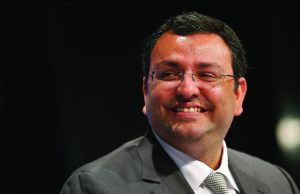 With the National Company Law Appellate Tribunal (NCLAT) dismissing the Registrar of Companies’ petition seeking modification of the judgment in the Tata-Mistry case and Tata Sons obtaining a stay from the Supreme Court on the NCLAT orders, the case is witnessing new twists and turns.
With the National Company Law Appellate Tribunal (NCLAT) dismissing the Registrar of Companies’ petition seeking modification of the judgment in the Tata-Mistry case and Tata Sons obtaining a stay from the Supreme Court on the NCLAT orders, the case is witnessing new twists and turns.
Tata Sons have moved the Supreme Court challenging the NCLAT order, saying the verdict “undermined corporate democracy” and the “rights” of its board of directors. The petition filed on behalf of the Tata Sons said, “Restoring Cyrus Mistry to the position as Chairman has undermined corporate democracy and the rights of the board of directors”. Tata Sons, Chairman Emeritus Ratan Tata and Tata Consultancy Services (TCS) have separately moved the Supreme Court against the NCLAT order.
On December 18, the tribunal ruled reinstating Cyrus Mistry as the Executive Chairman of Tata Group and also termed conversion of Tata Sons from a public company to a private one by the RoC as “illegal”.
The tribunal had termed the appointment of N Chandrasekaran, as ‘illegal’ following the October 2016 sacking of Mistry as Tata Sons’ executive chairman. It had also directed the RoC to reverse Tata Sons’ status from a ‘private company’ to a ‘public company’.
In its urgent application, which was mentioned on December 23, just five days after the NCLAT’s December 18, judgment, RoC Mumbai had asked the appellate tribunal “to carry out requisite amendments” in Para 186 and 187 (iv) of its judgment “to correctly reflect the conduct of the RoC, Mumbai as not being illegal and being as per the provisions of the Companies Act”.
Besides, it had also urged “to delete the aspersions made regarding any hurried help accorded by the RoC Mumbai to Tata Sons, except what was statutorily required” in para 181 of the order.
In the order, the appellate tribunal had quashed the conversion of Tata Sons into a private company from a public firm and had termed it as “illegal”. The tribunal had said the action taken by the RoC to allow the firm to become a private company was against the provisions of the Companies Act, 2013 and ‘prejudicial’ and ‘oppressive’ to the minority member.
The NCLAT order said, “The Company (Tata Sons) shall be recorded as ‘Public Company’. The RoC will make corrections in its record showing the Company as ‘Public Company”.
In a fresh development, the NCLAT refused to modify its judgment passed in the Tata-Mistry matter and dismissed the petition filed by the Registrar of Companies (RoC), saying that there was no ground to amend the judgment. A two-member bench headed by Chairman Justice SJ Mukhopadhyaya dismissed RoC’s plea.
On December 18, 2019, the NCLAT ordered restoration of Mistry as the executive chairman of the Tata Group. This judgement rendered N Chandrasekaran’s appointment as executive chairman of the company illegal. However, the appellate tribunal had granted Tata group four weeks to file an appeal before the Supreme Court against its judgment.
Cyrus Mistry later said that that he has no plans to rejoin Tata. He, however, said that he will “vigorously pursue all options to protect our rights as a minority shareholder”.
Shapoorji Pallonji Group scion Cyrus Mistry had been engaged in a boardroom battle against Tata Sons over his unceremonious termination from the company’s board in October 2016. He said, “To dispel the misinformation campaign being conducted, I intend to make it clear that despite the NCLAT order in my favour, I will not be pursuing the executive chairmanship of Tata Sons, or directorship of TCS, Tata Teleservices or Tata Industries.”
“I will however, vigorously pursue all options to protect our rights as a minority shareholder, including that of resuming the 30-year history of a seat at the Board of Tata Sons and the incorporation of the highest standards of corporate governance and transparency at Tata Sons,” he added.
Mistry said that his legal battle against Tata Sons was never about him, but rather to protect the rights of minority shareholders. He said that the Shapoorji Pallonji Group has been with the Tata group for the past decades and it is in his family’s interest to secure the group’s interests. “As an 18.37 per cent shareholder, it is in our own interest to ensure the. My family, although a minority partner, has been a guardian of the Tata Group for over five decades,” Mistry said. “This legal fight has never been about me. It has always been and will always be about protecting the rights of minority shareholders and upholding their right to demand a higher standard of corporate governance from controlling shareholders.”
He said that this statement is being made in the interests of the Tata Group, whose interests are far more important than the interests of any individual. “To dispel the misinformation campaign being conducted, I intend to make it clear that despite the NCLAT order in my favour, I will not be pursuing the executive chairmanship of Tata Sons, or directorship of TCS, Tata Teleservices or Tata Industries. I will however vigorously pursue all options to protect our rights as a minority shareholder, including that of resuming the 30-year history of a seat at the Board of Tata Sons and the incorporation of the highest standards of corporate governance and transparency at Tata Sons,” Mistry added.
The founding fathers of the Tata Group had laid a strong ethical foundation that cared for all stakeholders. The relationship between the Tata Group and the Shapoorji Pallonji Group is one spanning multiple decades that was built on common agreement and mutual faith.
Former Tata leaders worked together with the minority partner to create value for all stakeholders. In the last three years, both in conduct and in their statements to the world at large, the Tata Group’s leadership has shown scant respect for the rights of minority shareholders. It is time the Group’s management introspects and reflects on its conduct as it embarks on future actions.
The statement added “I am humbled by the NCLAT order, which after review of the enormous material on record recognized the illegal manner in which I was removed and the oppressive and prejudicial conduct of Mr. Tata and other Trustees”.
As an 18.37 per cent shareholder, it is in our own interest to ensure the Group’s long-term success. My family, although a minority partner, has been a guardian of the Tata Group for over five decades. This legal fight has never been about me. It has always been and will always be about protecting the rights of minority shareholders and upholding their right to demand a higher standard of corporate governance from controlling shareholders.
letters@tehelka.com












